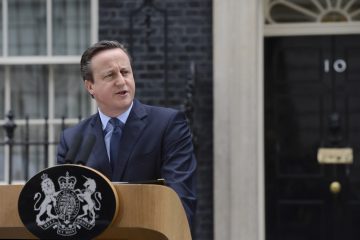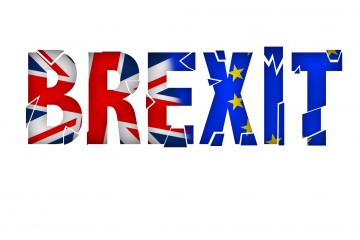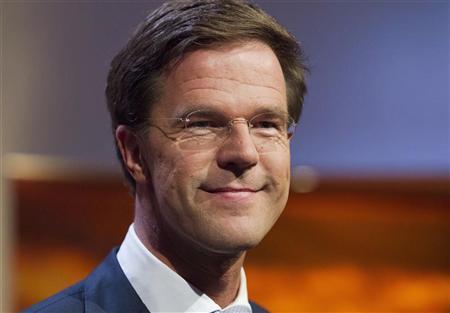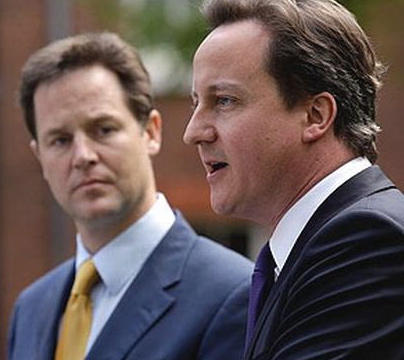
A tragedy: Lies, damned lies and Brexit
Viewed from the perspective of the three main protagonists, Cameron, Gove and Johnson, Brexit has variously been presented as a Greek tragedy or a spat between Oxford alumni[1]. Certainly the latter, it has real elements of the former. But, in truth, the real tragedy is the further erosion of British democracy. Prime Minister David Cameron reluctantly agreed to the inclusion of an in/out referendum in the 2015 Conservative election manifesto in order to appease the Eurosceptic right wing of the party.[2] Some commentators suggest that he never expected to have to deliver the referendum thinking that it would be vetoed by Liberal Democrats in coalition or else be voted down by the opposition[3]; certainly it was a referendum that he …

Brexitania: Post-truth politics, the fallout, and the way forward
The UK’s Brexit referendum outcome has left Europe, and the world, in disbelief. After 40 years, Britain’s historic decision to turn its back on the European Union has divided the country—a division that cuts not only across families and friends, but also between the “establishment” and the electorate. It is perhaps this latter divide that is most pronounced. But will this division last? Brexit presents a unique opportunity to expose and debate some of our most pressing problems, and to restore the bonds of trust between voters and the political elite. Britain divided by elite maneuverings Britain leaving the EU does present some important challenges—both economic and social— that have splintered the British political, economic, cultural and ideological landscape. It …

Brexit and Political Education: Ariadne’s Thread Leads to Leave
An impressive list of academics, including seven Oxford faculty members, signed a petition in mid-June calling for new strategies to deal with misinformation. It makes very good sense to desire competent opinion as opposed to misinformation, and to argue that democratic legitimacy of the referendum’s outcome in some sense rests upon informed choice. (A specific example of a helpful intervention is this letter from the UK Statistics Authority challenging the “potentially misleading” statement of Nigel Farage about the “independence dividend” of Brexit.) These epistemic interventions need to be given more thought, but they all share the same classic problem: Who shall watch the watchers? While oversight and accountability genuinely help the democratic process, representing the proper style of character and …

Brexit referendum folly
The consequences of the Brexit referendum are bad for both Europe and Britain, regardless of the result. The EU referendum in the United Kingdom was intended as a festival of democracy, but it has proved to be an exercise in political madness. Brits pride themselves on being sensible and pragmatic people, but they embarked on a sentimental journey into the unknown. Rational arguments are being set aside while populists are having a party. The prospect of a referendum with an uncertain result has already caused a great deal of disarray, and those who count the costs of a possible Brexit should realise that major damage to Europe and the United Kingdom has already been done. A few million partisan national …

Why Conservative MPs back Brexit (or not)
Ever since the Conservatives’ surprise win of a Parliamentary majority in the 2015 general election, the EU referendum has been at the centre of public debate. There has been much speculation about how many Conservative members of parliament (MPs) would back Brexit. Now David Cameron’s renegotiation has been concluded, MPs are free to choose sides in the referendum debate. Ever since, scores of Conservative of MPs, including the Mayor of London and six Cabinet Ministers, have endorsed the Leave campaign. Other MPs have sided with the Prime Minister and the Chancellor in backing Remain. My DPhil research focuses on the position of members of parliament with regards to Europe. In this article I use my own dataset of Conservative MPs …

The Legal Framework: What happens if we vote for Brexit?
The EU referendum could be held as early as June so clarity is needed about what will happen in the event of a vote to leave. In this post Alan Renwick explains Article 50 of the Lisbon Treaty which sets out the procedure for leaving the EU. Under it a second in/out referendum of the type floated by Boris Johnson among others is not possible. Anybody suggesting that voters can vote to ‘leave’ safe in the knowledge that they can later change their minds is either playing with fire or manipulating voters disingenuously. 2016 looks likely to be the year in which voters get to decide whether the UK will stay in the European Union. If David Cameron secures a deal with other EU leaders …

How to run TV debates in a multi-party system
Today, the people of the Netherlands vote for their provincial governments. On face value, the Dutch middle legislative tier has limited powers. However, the results of these elections will also determine the composition of the Eerste Kamer, the Netherlands’ legislative upper house. Elections are also simultaneously held for the Water Board, arguably the most important institution in the Netherlands given its responsibility for water levels, dyke planning and maintenance and other such responsibilities that keep the population’s feet dry. All in all, it’s an important day at the polls.
According to modern conventions, important elections require a TV debate between party leaders, but this is easier said than done in a political system where eleven parties (plus an assortment of regional parties and independents) are represented in the political system. The Dutch have arrived at an innovative solution, running a series of one-on-one mini debates featuring two party leaders at a time.
Last night’s ‘TV debate’ featured nine debates in total, each discussing a different topic, and each lasting a little less than ten minutes. The leaders of the six ‘main’ parties (VVD, PvdA, CDA, D66, SP and PVV) each had two opportunities to debate, while the leaders of the six ‘small’ parties (Green Left, Christian Union, 50+, Party for the Animals, Reformed Political Party and Independents) each had the chance to debate once. Topics debated ranged from energy policy to health insurance.

What Next for Britain’s Pro-Europeans?
Having, until now, benefited from the tacit support of the existing political elite, Britain’s pro-European lobby has had less incentive to create a formal political movement. However, if the anti-European jungle drums continue to beat louder, it seems only a matter of time before the pro-Europeans organise, perhaps in advance of the June 2014 European elections.









